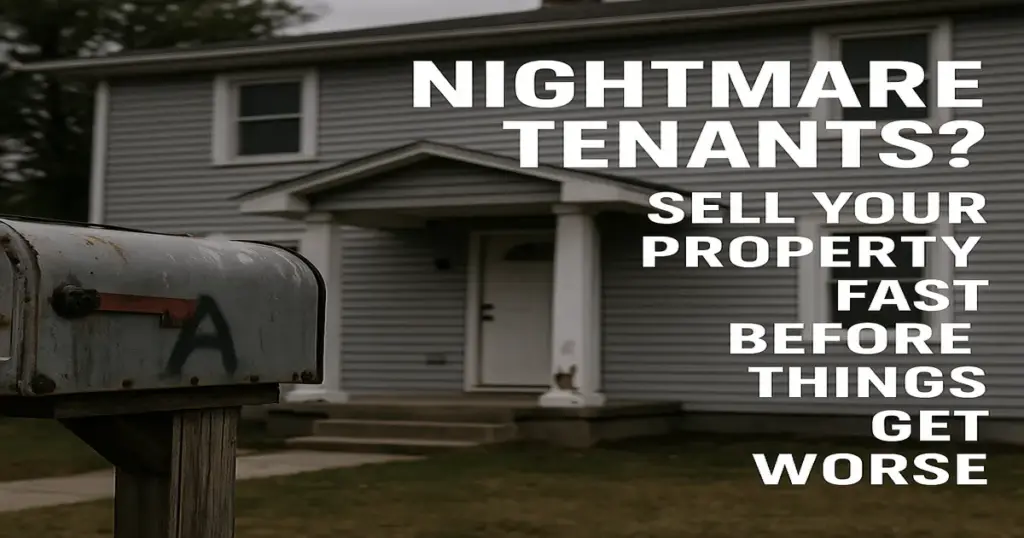Nightmare Tenants? Sell Your Property Fast Before Things Get Worse
Owning rental property can seem like a dream—passive income, appreciating assets, and potential tax breaks. But when that dream becomes a nightmare due to troublesome tenants, the emotional, financial, and legal strain can quickly outweigh the benefits.
If you find yourself in this situation, selling your property fast might be the most brilliant move. This guide explores why nightmare tenants can wreak havoc, the risks of waiting too long to act, and how to sell your property swiftly and with minimal stress.
Understanding the “Nightmare Tenant”
Not all tenants are created equal. While many renters are respectful and pay on time, others bring chaos into landlords’ lives. A nightmare tenant might:
Refuse to pay rent
Ignore eviction notices
Cause property damage
Run illegal activities
Violate lease terms repeatedly
Intimidate neighbours or landlords
Hoard trash or animals
Sublet illegally
In some cases, tenants may start well-behaved and respectful, only to become problematic months into the lease. Sometimes, a change in life circumstances, mental health struggles, or substance abuse issues can transform a model tenant into a liability.
The Hidden Costs of Problem Tenants
The damage caused by nightmare tenants isn’t limited to your peace of mind. The costs—both visible and hidden—can be devastating:
Legal Fees and Eviction Costs
Evicting a tenant isn’t quick or cheap. Depending on your location, eviction proceedings can take months and cost thousands in legal fees, court costs, and sheriff’s assistance. During this time, you often can’t collect rent.
Lost Rent
Even if your tenant vacates, you lose income during any repair or turnover period. Those losses add up quickly if they refused to pay rent before leaving.
Property Damage
Nightmare tenants may leave significant damage—broken appliances, wall holes, dirty pets, mould and mildew, or pest issues. The cost of repairs can be staggering, especially if extensive renovations are required.
Stress and Mental Toll
Chronic stress from tenant conflicts can affect your sleep, work, and relationships. If you manage your property alone, you bear the full emotional weight of every problem.
Lower Property Value
A damaged or poorly maintained home occupied by unruly tenants can significantly lower your property’s market value. It may scare off traditional buyers who want a move-in-ready home.
Why Sell Fast? Timing Is Everything
The longer you wait to resolve tenant problems, the worse they usually get. Here’s why selling fast may be your best option:
Minimise Further Damage
The longer nightmare tenants stay in your property, the more opportunity they have to damage it. By selling quickly, you reduce your exposure to additional costs and deterioration.
Avoid Legal Hassles
In some jurisdictions, tenants have strong rights that can delay or complicate evictions. Selling the property—especially to an investor—may sidestep lengthy court battles.
Stop Bleeding Money
If you’re not collecting rent or your expenses outweigh your income, selling stops the financial haemorrhaging. You can reinvest your funds in a more stable opportunity.
Peace of Mind
Sometimes, the best return on investment is emotional. Offloading a stressful property allows you to move on with your life, focus on better prospects, and reduce your anxiety.
Who Buys Homes With Problem Tenants?
You might think, “Who would buy a house with nightmare tenants still inside?” The good news is that there’s a market for it.
Real Estate Investors
Investors often specialise in distressed properties. They buy “as-is,” handle tenant issues themselves, and have the legal and financial resources to deal with complications.
Cash Buyers
Cash buyers close quickly—sometimes within days. They don’t require appraisals or inspections and aren’t scared off by tenants, damage, or liens.
Wholesalers
Wholesalers act as intermediaries. They agree to purchase your home and then find a buyer in their network willing to take it on. This can be a faster alternative to the open market.
How to Sell a Property With Difficult Tenants
If you’ve decided to sell your property with problem tenants still occupying it, there are ways to do it effectively and legally:
Understand Tenant Rights
Always consult local landlord-tenant laws. You must provide written notice in many areas before showing the property or completing a sale. Some tenants may be protected under rent control or other local statutes.
Offer “Cash for Keys”
Sometimes, paying the tenant to leave voluntarily is cheaper than eviction. Offering a few hundred or even a thousand dollars in exchange for vacating can save you thousands in legal fees and repairs.
Sell to a Cash Buyer
Seek out investors who advertise “we buy houses in any condition.” These buyers are used to challenging situations and can make offers with minimal contingencies.
Disclose Everything
Be transparent about tenant issues with potential buyers. Trying to hide the problem can backfire legally and ethically. Buyers appreciate honesty, and often factor tenant problems into their offer price.
Avoid the MLS
Traditional buyers usually want clean, vacant homes. Listing a tenant-occupied property on the MLS may waste time and attract lowball offers. Instead, contact investors directly or work with a wholesaler.
Real Stories: When Landlords Wait Too Long
Case 1: The “Professional Tenant”
In Chicago, a landlord rented her condo to what seemed like a perfect tenant. After two months, the rent stopped coming. The tenant claimed she needed repairs and used legal loopholes to avoid paying rent for over a year. By the time the landlord won an eviction case, the unit was a mess, and she had lost over $25,000.
Case 2: Drug Activity in a Duplex
A small-time landlord in Houston rented out part of his duplex to a tenant who later started dealing drugs. Police raids followed, damaging the property and reputation. He struggled to evict the tenant and ultimately lost the property.
Case 3: Emotional Toll
A retired couple in Florida tried to manage their own rental, but after attempting to raise the rent, they were verbally abused and threatened by their tenant. They sold their investment at a discount to reclaim peace in their retirement years.
The Selling Process: Step-by-Step
Here’s what the process of selling a property with nightmare tenants might look like:
Contact a Real Estate Investor or Cash Buyer
Reach out to a company or individual that specialises in buying difficult properties.Schedule a Property Assessment
They may request a brief walkthrough or photos, but they won’t require access to every room in many cases.Receive a Cash Offer
Offers are typically made within 24–72 hours.Review and Accept the Offer
There’s no obligation, and you can decline if the offer doesn’t meet your needs.Close the Sale
Most investors can close in 7–14 days. The buyer takes possession of the property and the existing situation.
Pros and Cons of Selling Fast
Pros:
Immediate relief from stress
No repair costs or renovations needed
Avoid court battles or evictions
Free up cash quickly
Stop losing money
Cons:
Lower selling price than the market average
Limited pool of buyers
Must accept a quick timeline for decisions
Despite the drawbacks, many landlords in challenging situations find that the benefits of a fast sale outweigh holding onto a toxic asset.
Preparing for Your Next Move
After selling your tenant-troubled property, take time to reassess your investment goals. If you plan to continue in real estate, consider:
Hiring a property management company
Screening tenants more rigorously
Investing in new-build properties or turnkey rentals
Joining a landlord association for support
Use your experience as a learning opportunity, not a defeat.
Frequently Asked Questions (FAQs)
Can I legally sell my property with tenants still living in it?
Yes, you can. However, you must follow local laws regarding tenant rights, notices, and lease agreements. Some leases may transfer to the new owner, while others may require negotiation.
Do I need tenant cooperation to sell the home?
Not necessarily. While cooperation makes showings and inspections easier, cash buyers and investors often purchase homes without needing full access or cooperation from tenants.
What is “cash for keys”?
“Cash for keys” is an informal agreement where you pay tenants a set amount to leave the property voluntarily. It’s faster and usually cheaper than pursuing an eviction.
How do I find a cash buyer for a problem property?
You can search online for “we buy houses” companies, contact local real estate investment groups, or ask your real estate agent to connect you with an investor specialising in tenant-occupied properties.
Will I get market value for my property?
Probably not. Most buyers will discount their offers to reflect the risk and costs involved. However, the convenience and speed of the sale may make it worthwhile.
How fast can I close?
Many cash sales close in 7–14 days. Some investors can move even faster if the title is clear and the paperwork is ready.
What if my tenant is dangerous or threatening?
In such cases, consult an attorney immediately. Do not confront the tenant directly. Inform the potential buyer of the situation—some investors are prepared to handle challenging or dangerous tenants professionally.
Is selling better than evicting first?
It depends. Eviction can take months and cost a lot. Selling “as-is” can be the fastest path to avoid the hassle.
Conclusion
Nightmare tenants can turn your property from an asset into a liability. The longer you delay action, the more time, money, and emotional energy you risk losing. Selling your property fast—before things spiral further—can be a practical and empowering choice. Whether you’re exiting the rental game or resetting your strategy, there’s always a path forward.
With the right approach and buyer, you can move on from your tenant troubles and reclaim peace of mind.
Useful Links
Gov.uk – Private Renting: Evicting Tenants
https://www.gov.uk/evicting-tenants
Official government page explaining the process for serving Section 21 and Section 8 notices, plus court procedures.Shelter England – Tenancy Rights and Eviction
https://england.shelter.org.uk/housing_advice/eviction
Useful to understand the rights of tenants and the legal limits of landlord actions.Citizens Advice – Eviction and Rent Arrears
https://www.citizensadvice.org.uk/housing/renting-a-home/eviction
Provides balanced guidance on eviction rules and when landlords can legally act.
Read our top Blogs:
Sell My Property Fast For Cash In Wandsworth
What to Do If Your House Won’t Sell: Fast Solutions That Work
How to Sell House Fast: Proven Tips to Get a Quick Sale Without Estate Agents
📞 Call +447702210159 our friendly team for a same-day offer





